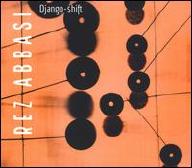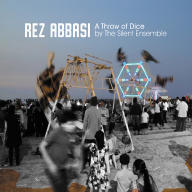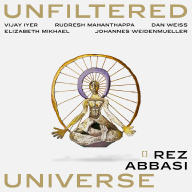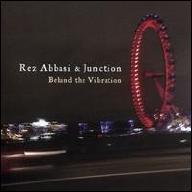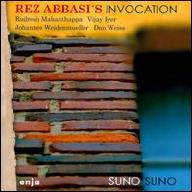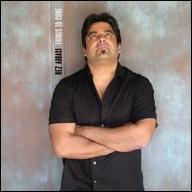Born in Kurachi in 1975, Abbasi's parents migrated to the United States when he was four. His primary language was English. He studied piano as a child and began playing the guitar in high school. He was turned on to jazz while attending a concert with his parents by Joe Pass and Ella Fitzgerald. He attended the University of Southern California before moving to New York in 1987 to attend the Manhattan School of Music. While studying jazz there, he met a number of other Indian and Pakistani musicians and plugged deeply into sacred and classical music from the region. He made a pilgrimage to India in order to study with master percussionist Ustad Alla Rakha. In his early years, Abbasi's biggest influences on the guitar were Jim Hall, Pat Metheny, and Bill Frisell. True to form, however, he sounds like none of them. Abbasi cut his first self-titled, self-released cassette in 1993, while gigging as a sideman and assembling his own band in New York. Two years later he released Third Ear on Cathexis. Recorded over two sessions in as many years this alternating group of players included pianists Kenny Werner and Marc Copland, bassists Scott Colley and Marc Johnson, drummers Peter Erskine and Ben Perowsky, and saxophonists Billy Drews and Bob Mintzer. The album drew positive notice from jazz publications that hailed it for Abbasi's chops and melodic invention. 1998's Modern Memory was lauded for its six original post-bop compositions bookended by tight and inventive readings of tunes by Hermeto Pascoal and Thelonious Monk.
2002's Out of Body was cut for String Body by a world fusion jazz quintet that included bassist Bob Herbert, drummer Bruce Hall, saxophonist Tony Malaby, and trumpeter Ron Horton. By 2005, the guitarist had an entirely new quintet with drummer/percussionist Weiss, Abbasi on guitars and sitar, Gary Versace on organ, David Liebman on soprano saxophone, and vocals and tambura from Ahluwalia. It set the jazz community alight with its canny, seamless juxtaposition of raga, borgeet, and thumri with avant post-bop. After playing N.Y.C. with this band, Abbasi returned to the studio and doubled down on his vision with the following year's Bazaar, that featured no less than ten players including Mahanthappa, Ahluwalia, Gautam Siram, and Weiss. Issued on Zoho, the set made the bottom half of the U.S. jazz charts. Abbasi toured his various bands across the U.S. and Europe playing festivals. In 2008 he played on Bob Belden's Miles from India, a celebration of Miles Davis' On the Corner by a host of modern players including saxophonist Javon Jackson, flutist N. Ramani, Hagans on trumpet, and former Davis sidemen Adam Holzman on keys, Darryl Jones on bass, Ndugu Chancler and Vincent Wilburn, Jr. on drums, and V. Selvaganesh playing kanjira, ghatam. The set earned accolades for Abbasi's creative approach to Davis' deliberately rough edges as they met the raw margins of Indian raga.
The guitarist returned to the studio as a leader in 2009 and issued Things to Come for Sunnyside. His sidemen included familiar players such as Mahanthappa, Weiss, Iyer, and Ahluwalia. After two intense bouts of touring and playing on recordings by Mahanthappa -- Kinsmen and Apti -- with the Indo Pak Coalition, Abbasi cut two records for Enja: Suno Suno in 2011 by Rez Abbasi's Invocation, and Continuous Beat in 2012 with a complex yet canny modern jazz trio consisting of the guitarist, drummer Satoshi Takeishi, and bassist John Herbert.
In addition to his own groups, Abbasi has played sideman on global tours and in the studio with top-flight jazz artists including Ruth Brown, Barre Phillips, Tim Berne, Billy Hart, Marvin Smitty Smith, Dave Douglas, Mike Clark, Vishwa Mohan Bhatt, Marilyn Crispell, and Greg Osby. The guitarist resurfaced as a leader for 2016's Cuneiform release Behind the Vibration with a new avant-jazz fusion quartet called Junction, comprised of drummer Kenny Grohowski, keyboardist/organist Ben Stivers, and saxophonist Mark Shin.
In 2017, Abbasi signed a multi-album deal with Whirlwind Recordings. His debut for the label was Unfiltered Universe; it reunited him with Mahanthappa, Iyer, Weidenmueller, and Weiss, and featured renowned classical cellist Elizabeth Mikhael. It completed a trilogy of albums that began with Suno Suno and continued with Things to Come. Those two recordings focused their attentions to varying degrees on Hindustani and Qawwali music, while these seven originals explored and embraced the rhythmically exuberant, South Asian elements of Carnatic instrumental music.
Abbasi worked with a trio version of Mahanthappa's Indo-Pak Coalition on the vinyl-only double-length set Agrima in 2017, and in 2019, played guitar in bassist Michael Janisch's octet for the widely acclaimed Worlds Collide (also issued by Whirlwind). In October, he released Oasis, for Enja/Yellowbird, a collaboration with French classical harpist Isabelle Olivier, Prabhu Edouard on tabla, and David Paycha on drums. Save for Richard Rodgers' "My Favorite Things," the set featured compositions by both leaders and explored swinging post-bop and vanguard improvisation.
During these sessions, Abbasi was rehearsing another new group to record and perform his first film score. A Throw of the Dice was commissioned in 2017, by New York Guitar Festival curator David Spelman, to accompany German director Frank Osten's historic silent film shot in Rajasthan and based on a story from an episode in The Mahabharata. The set was designed for the band to play live during a screening. Abbasi's Silent Ensemble featured the guitarist alongside saxophonist/flautist Pawan Benjamin, bassist/cellist Jennifer Vincent, Carnatic percussionist Rohan Krishnamurthy, and drummer Jake Goldbas. Released by Whirlwind in November 2019, it was followed by performances in Paris, Washington, D.C., and New York City. ~ Thom Jurek, Rovi


